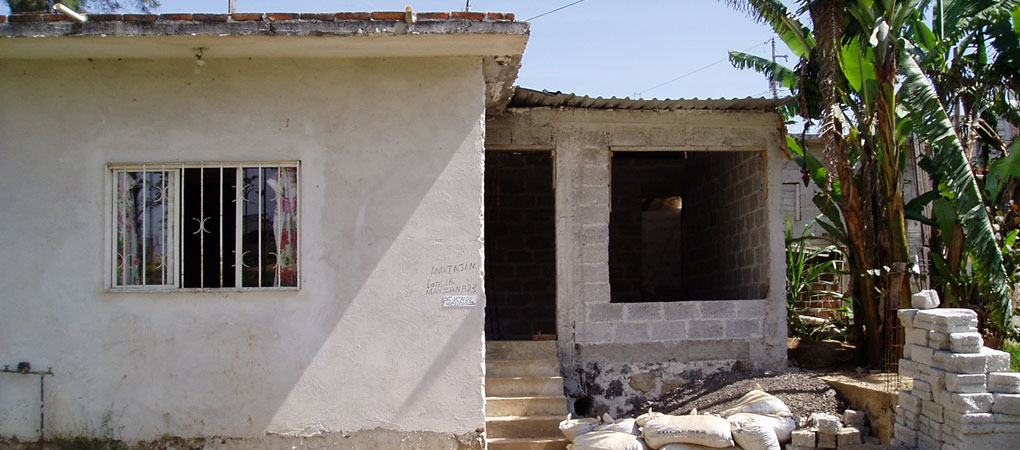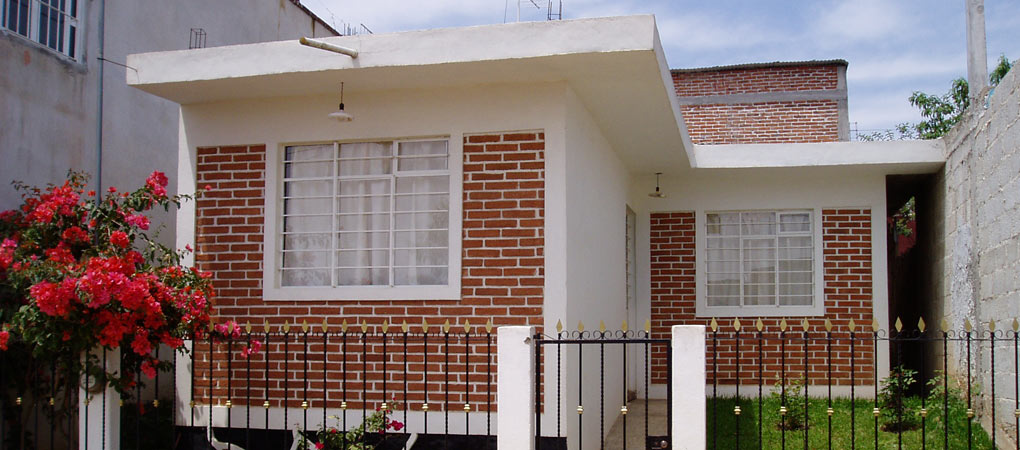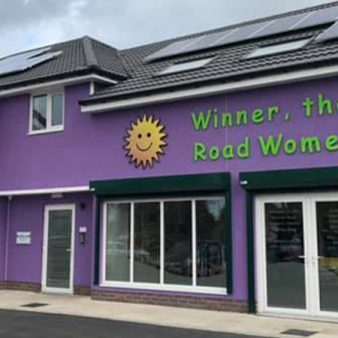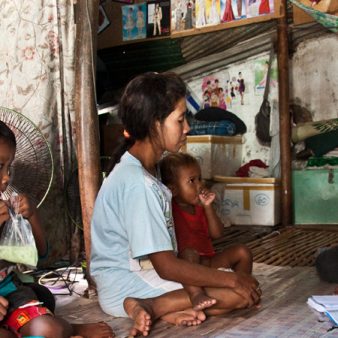This incremental housing programme, developed by the community-based organisation UCISV-VER, combines resources from participating families with traditional joint savings schemes and micro-credit to help families who have no access to formal credit build new homes or improve their existing accommodation. The construction process is phased to avoid families becoming financially overstretched. Families are involved in the design process of their homes and training is provided in self-help construction methods. The consolidation of community organisation and solidarity, the empowerment of women and development of savings capacity are important elements of this well-established programme that has to date funded the construction and/or improvement of 684 homes in the state of Veracruz.
Project Description
Aims and Objectives
- To promote urban development in the low-income areas in Veracruz through the social production of housing.
- To consolidate community organisation, savings capacity and solidarity, particularly among women.
- To generate economic sustainability for the social production of housing processes.
- To participate in the development of public policies related to the social production of housing for low-income groups.
Although the state of Veracruz is rich in natural resources it has very high levels of poverty (fifth poorest out of the 32 states of Mexico). It has a population of six million, 45 per cent of whom live in the main urban zones. The existing housing stock is of poor quality and there is a deficit of more than 250,000 units. Of the 1.6m dwellings, 26 per cent have earth floors and 30 per cent have walls made of cardboard, palm leaves, or other temporary materials.
In Xalapa 65 per cent of the workforce earns less than 3 minimum salaries and a fifth earns less than one minimum salary (US$3.80 per day). The last decades have seen a massive and rapid increase in the urban population as rural workers have moved in large numbers to the city and settled in peripheral informal settlements (where 46 per cent of the population now live). There is tremendous pressure on urban services and the systems suffer from lack of development and maintenance. There is a particular lack of structural support for irregular settlements that continue to expand at an accelerated rate. The problems are further exacerbated by lack of infrastructure and other essential services.

Commencing in 1997, the Progama de Vivienda Popular was introduced to address some of these issues. The actual programme is designed to operates in two parts. Firstly organising payments for the land and secondly for the incremental housing construction. The first stage is carried out by organising participants into groups of seven families who begin saving money (US$160 over 4 months) in the traditional Mexican “tanda” system of pooling money for communal purposes, supplemented by traditional joint savings schemes and micro-credit. A Show House was developed in the early stages to demonstrate what the savings would be able to purchase. It is based on one of Xalapa’s traditional architectural styles (an interior patio that is surrounded by a corridor) that is becoming increasingly rare. It also incorporates a shower, washing area and natural plant root drainage system to filter waste water. It continues to be used as a source of design ideas by local families as well as a community facility.
The construction process is multi-staged to avoid families becoming financially over-stretched. During the saving period each family designs his/her house in conjunction with an architect through a series of community workshops. The actual house designs use traditional patterns and characteristics.
UCISV has successfully constructed broad-based partnerships that combine resources from participating families with that of the revolving funds established by international donors. Of the 684 families that have completed their homes, 83 per cent of the group leaders have been women. The average monthly income is 1.7 minimum salaries, i.e. US$193, with typical employment as domestic servants, housewives (40 per cent), builders and office workers. The project has raised political awareness of the need for adequate housing.
The total cost of the programme to date is US$960,000 of which 69 per cent of the cost comes from the revolving fund, 11 per cent comes from the Tanda savings scheme and 20 per cent from the Veracruz state government.
Why is it innovative?
- Communal saving (using a traditional mechanism) for modern urban housing.
- Participatory design and multi-staged construction.
- Sustained emphasis on neighbourhood improvement.
Social production of housing.
What is the environmental impact?
Alternative building materials and drainage technologies have been developed as part of the programme and bamboo is being used as a structural component in some cases. Dry latrines and the use of living plants as filtering systems have both been used as part of the programme and have been found to be highly effective, however the use of alternative materials and systems is often regarded with suspicion and as yet is not widely accepted by beneficiaries. Nevertheless, UCISV continues to actively promote safe and sustainable alternatives to conventional building materials and systems.
Is it financially sustainable?
Construction training skills have enabled some of the population to earn an improved living in the construction trade. Micro-loans are provided by the programme to support small business enterprises.
The programme activates the savings and investment capacity of low-income families (i.e. those below 3 minimum salaries). There are no other sources of housing credit for these families, so this programme represents their only opportunity to have an affordable and good quality home. And since the house is designed to be built in four phases, families can afford to extend the basic unit of large room, exterior terrace and toilet.
What is the social impact?
Training and awareness raising programmes have served to increase the co-operation in local communities. The project has resulted in political awareness raising and managerial expertise being developed through involvement in the governance of the organisation. Women have demonstrated their capacity for organisation and administration and their participation has been consistent. It is clear that the women’s self-esteem is affected very positively as they now undertake activities both inside and outside the family that they did not previously.
Partnership
NGO, local community, local government, international agency



